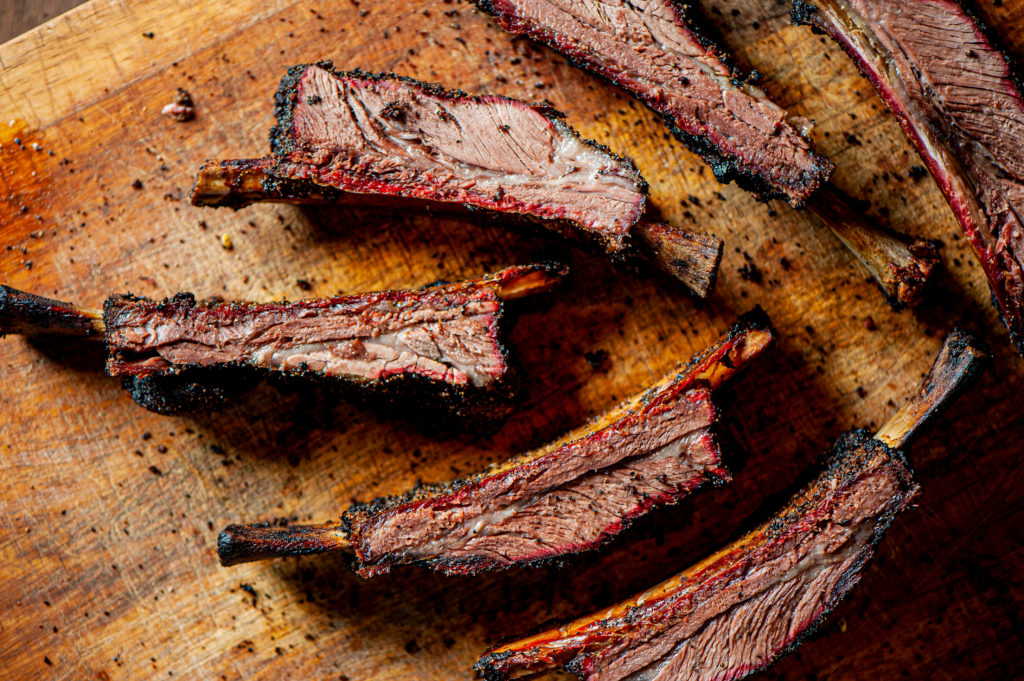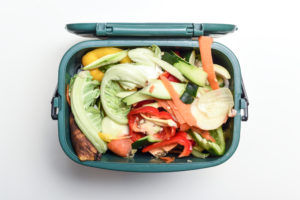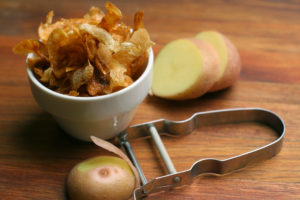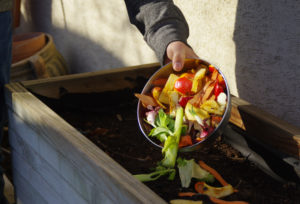As the largest city in the largest contiguous state in the US, the scale of the food waste problem in Dallas is huge. Unfortunately, for many of the city’s 1.3 million residents, the concept of recycling food and other organic materials remains a little foreign—surely food biodegrades quickly, unlike plastics or metal? How much damage can food scraps really do?
The truth is that the issues surrounding how to deal with food waste in Dallas are among the biggest facing the city, the country, and the globe, with this particular waste stream responsible for significant environmental, financial, and social impacts.
Today, the City of Dallas is beginning to take action to combat food waste, but there’s still a long way to go. To help understand the statistics that highlight the issue and encourage individuals and businesses to minimize impact, we’ve put together a guide on reducing, reusing, and recycling food waste in Dallas.
Why recycle food waste in Dallas?
Each day in the United States around one pound of food per person is wasted. That’s around 40 million tons a year. In fact, 20% of all waste produced in the US is food. If that doesn’t alarm you, think about it in financial terms—around $161 billion of wasted food and around 30 to 40% of the total edible produce in the US food supply. That’s about $1,600 per family, per year.
Compounding this issue is the fact that a huge portion of food waste could potentially be reused. According to the National Resources Defense Council (NRDC), around 68% of food waste is still edible and could be used to help those in need. Food waste organization Green Dallas puts the food insecurity rate in Texas at 18.4% (higher than the 14% national average), and more than 27% of children in Dallas under the age of 18 live in households that have experienced food insecurity in the last year. Closing this particular food waste loop could make a huge difference to many people’s health and well-being.
However, the issues surrounding commercial and residential food waste don’t end there.
Food waste that ends up in landfill produces methane as it decomposes. According to the EPA, methane is around 21 times more harmful than carbon dioxide, and reducing the amount of food that ends up in landfill could cut total emissions by around 8%.
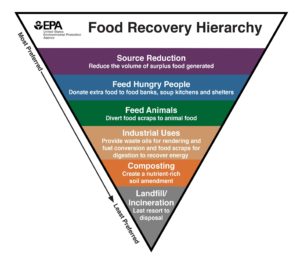
Source: epa.gov
Today, the recycling rates within the city are 21%, significantly lower than the national average of 32%. The City of Dallas also has one of the poorest diversion rates in the state, and around a fifth of homes have no collection program at all, let alone food recycling provisions.
The challenge is clear. But what can be done to overcome food waste in Dallas? Three steps can be taken to avoid sending food to landfill. These correspond to the EPA’s Food Recovery Hierarchy Pyramid, providing a logical and comprehensive strategy for reducing the burden on local landfills and improving diversion rates.
How to tackle food waste in Dallas – reduce and donate
The first step is to prevent wasting food by ensuring you do not buy too much from the grocery store and that all edible food is eaten. We often simply don’t have enough time or need to eat all the food we buy. But rather than letting it slowly expire, it can be donated to pantries that will redistribute it to food-insecure people. This is especially useful for small businesses when over-ordering or lack of demand creates a surplus.
Dallas has several food pantries that accept donations, however, it is always advised that you check opening hours and capacity, especially if you are donating large amounts of food. Many food pantries are staffed by volunteers or are under-resourced and may need advance warning for larger donations. Also, be aware that not all food is suitable for donation.
Small businesses should also be aware of the 1996 Bill Emerson Good Samaritan Food Donation Act. This law was signed by President Bill Clinton to encourage food donation, offering:
- Liability protection for donations to non-profit organizations
- Civil and criminal liability protection for donations made in good faith that may later cause harm to the recipient
- Standardizes donor liability exposure reducing the need to investigate liability laws in 50 states
- Standardizes “gross negligence” or intentional misconduct for persons who donate food products that includes “voluntary and conscious conduct by a person with knowledge (at the time of conduct) that the conduct is likely to be harmful to the health or well-being of another person.”
What to do with food waste in Dallas? Recycle and compost
Not all food can be reused or donated in this way, but rather than throwing it away, food scraps can be added to a compost pile. It’s easy to create a domestic composting bin. The EPA has a comprehensive guide that tells you everything you need to know, including what you can and can’t compost and what you will need to get started. Additionally, you can find information on the Dallas City Hall website.
Of course, not everyone has the space or resources to compost their food waste, so what is the city doing to make food waste recycling easier for residents and businesses?
While there is not a city-wide compost collection service, there are many small organizations offering food waste collection and drop-off locations in the city for a fee. And in neighboring Fort Worth, there is a food composting program where residents have the opportunity to turn their scraps into compost.
The pilot program was launched in 2019 and asks residents to pay a $20 annual fee for a composting starter kit that includes a countertop pail and other educational materials. When full, residents can drop off their composting pails at several locations across the city. You can find a list of composting drop-off sites here.
In general, compostable materials include:
- Fruits, vegetables, and eggshells
- Coffee grounds, tea, and nuts
- Dried flowers and houseplants
- Bread, grains, and pasta
- Yard waste
- Meat, fish, and dairy products
The following is generally not accepted:
- Pet waste and kitty litter
- Medical waste, diapers, and personal hygiene products
- BPI-certified compostable plastic products
If the Fort Worth program is a success, it is hoped it will extend to Dallas. The ultimate goal would be city-run curbside composting programs across the city, in a similar way to programs in San Francisco and Portland, Oregon.
What to do with leftover food waste in Dallas? – Anaerobic digesters
For the food waste that cannot be donated, or is not suitable for home or community composting, the question of how to control leftover food waste in Dallas remains. The answer may be anaerobic digestion. This is a process of treating food waste to reclaim reusable fuel.
Methane gas can be harvested from non-compostable food waste for both domestic and commercial use. While not an ideal solution, as this gas still has an environmental impact, it’s preferable to landfill, and delivers some sustainability benefits by minimizing the amount of methane released into the atmosphere. The commercial potential of methane production also has an appeal that could drive innovation.
While not currently in operation, North Texas has received $300,000 in funding from the EPA to help reduce waste by diverting food scraps from landfill by expanding anaerobic digestor capacity in the state. The funding forms part of the EPA’s Winning on Reducing Food Waste Initiative.
While the city catches up, there are other ways of ensuring your waste, including food, is diverted away from landfill. Here at RTS, we are committed to providing reliable, transparent, and sustainable services that not only allow your business to work towards furthering your sustainability goals through on-demand and scheduled collections, but also provide the education and resources you need to work towards zero waste.
For more information on how your business can reduce food waste, or optimize your existing waste management operations, contact our TRUE advisors today. Additionally, subscribe to the RTS blog for more information on sustainable materials, waste reduction, and recycling

